 Shocking moments when PLA's weapons open fire
Shocking moments when PLA's weapons open fire Famous Lanzhou beef noodles
Famous Lanzhou beef noodles Armed Police hold anti-terrorism drill in SE China's Xiamen
Armed Police hold anti-terrorism drill in SE China's Xiamen Harbin Int'l Ice and Snow Festival opens
Harbin Int'l Ice and Snow Festival opens 'Jin' named the word of the year by cross-strait netizens
'Jin' named the word of the year by cross-strait netizens Chinese scientific expedition goes to build new Antarctica station
Chinese scientific expedition goes to build new Antarctica station
 Chinese naval escort fleet conducts replenishment in Indian Ocean
Chinese naval escort fleet conducts replenishment in Indian Ocean 17th joint patrol of Mekong River to start
17th joint patrol of Mekong River to start China's moon rover, lander photograph each other
China's moon rover, lander photograph each otherShinzo Abe brought a disappointing end to the first year of his second term as prime minister and will face further thorny issues in 2014, says expert.
In the eyes of Pang Zhongpeng, a Japan-watcher at the Chinese Academy of Social Sciences, Abe made a good start after he returned to power in 2012. The turning point came in July when Abe promised to make the economy a priority, and gained a handy victory in a crucial election to the upper house of the Diet.
“After taking back control of the upper house, Abe put his promise aside and shifted the focus to security issues,” says Pang.
Security issues and the military build-up took the top spot on the Abe cabinet’s agenda in the last four months of 2013. In December a U.S-style National Security Council was created, which is designed to strengthen the leadership of the prime minister's office in steering foreign and defense policies, and a state-secrets law toughening penalties for leaks was enacted. The country is also going to spend almost 5 trillion yen on defense in the 2014 fiscal year, the biggest rise in 18 years.
Although Abe’s power base seems stable for the moment, he will quickly lose public support if his “Abeconomics” fails to put Japan back on track to a quick recovery, says Pang.
Quantitative easing, known as the “first arrow” in the Abeconomics quiver, only hit the target in part, curbing the rapid appreciation of the yen. But it is far from certain whether the remaining arrows, including a flexible fiscal policy and structural reform, will prime the pump of strong growth for Japan’s economy.
The passage of the state secrets law dented the government’s popularity, and Abe’s provocative visit to the Yasukuni Shrine angered Japan’s Asian neighbors and did the prime minister few favors at home. The ‘bad news’ is that Abe’s public approval rating may continue to drop, according to Japanese media.
There are signs indicating that Abe will stick to the economy this year but the road ahead is tough. In order to combat deflation, the country's public spending - excluding the cost of servicing public debt - will expand to a record high of 72.6 trillion yen in fiscal year 2014.
In early 2014 Japan will release a basic energy plan for the next 20 years. Abe’s preference for nuclear power, which he considers to be the reliable power supply on which economic revival can be based, may be hit by public opposition - a result of the 2011 Fukushima nuclear crisis. The struggle to square his energy policy with public opinion may prove to be Abe’s “Sword of Damocles”, according to Pang.
“His foreign policy deserves our attention as well. In 2013, relations between Japan and its neighbors in northeast Asia were tense. This year marks the 120th anniversary of the bitter Sino-Japanese War of 1894-1895, and the ongoing Diaoyu dispute will make 2014 a very sensitive year for the China-Japan relationship,” says Pang.
 In photos: Ten 'tuhao' devices in 2013
In photos: Ten 'tuhao' devices in 2013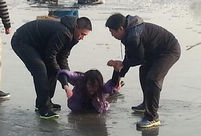 College students saved from an ice hole by brave citizens
College students saved from an ice hole by brave citizens Gallery: Top 10 box office hits in 2013
Gallery: Top 10 box office hits in 2013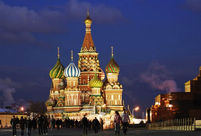 Beautiful churches around the world
Beautiful churches around the world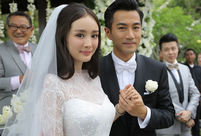 Yang Mi, Hawick Lau hold wedding in Bali
Yang Mi, Hawick Lau hold wedding in Bali 'Phubbing' people seen everywhere
'Phubbing' people seen everywhere World's biggest snack shop in China
World's biggest snack shop in China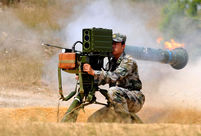 Shocking moments when PLA's weapons open fire
Shocking moments when PLA's weapons open fire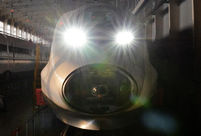 World's fastest train CRH380A assembled in E China
World's fastest train CRH380A assembled in E China Top 10 box office hits in 2013
Top 10 box office hits in 2013 In photos: Ten 'tuhao' devices in 2013
In photos: Ten 'tuhao' devices in 2013 Real estate tycoon measures PM2.5
Real estate tycoon measures PM2.5  'I am on a journey to lose weight'
'I am on a journey to lose weight' 'Cute' artifacts exhibited in Nanjing Museum
'Cute' artifacts exhibited in Nanjing Museum Advanced Chinese weapons that stepped into spotlight in 2013
Advanced Chinese weapons that stepped into spotlight in 2013Day|Week|Month